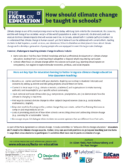How should climate change be taught in schools?
Climate change is one of the most pressing issues we face today, with long-term risks for the environment, the economy, and the well-being of our societies. As 25% of the world’s population is under 18 years-old, children and youth are most at risk from climate impacts that will worsen over time. In Canada, almost half of students (46%) in Grades 7 to 12 understand that climate change is human caused, yet don’t believe it can be addressed with current efforts, leading students to feel hopeless, scared, anxious, and dismissive. School is therefore an ideal place to learn about climate change and to develop a generation of young people who are equipped to meet this large-scale challenge.
However, challenges to teaching climate change in schools include:
- Some educators feel they have limited knowledge and lack professional development on climate change education, leading them to avoid teaching it altogether or beyond what’s required by curriculum.
- Schools often focus on climate change within the science curriculum (e.g. learning about impacts on ecosystems), but neglect to explore broader economic, political, and social impacts.
Here are key tips for educators looking to better integrate climate change education into classroom teaching:
- Become a co-learner and learn with your students. Begin by connecting to students’ interests and concerns by asking questions and designing projects around these concerns.
- Connect to local experts (e.g. climate scientists, academics) and organizations to make learning authentic and meaningful to your specific school community.
- Track national and local climate data (e.g. temperature, precipitation, etc.) to demonstrate how the climate is changing in real-time.
- Find ways to connect climate change to other subjects beyond science class (e.g. social studies, mathematics, English).
- Empower youth by focusing on the positive change they can create, rather than framing the issue as complex and impossible to act on.
- Look at promising practices of how other schools are teaching about and addressing climate change (e.g. Learning for a Sustainable Future).
- Encourage respectful dialogue when students encounter opinions that are different from their own.
As part of the Paris Agreement on climate change, Canada committed to “enhance climate change education.” Educators don’t need to be climate change experts. Rather, they can use their positions to go beyond teaching just the facts in ways that allow students to participate in activities that have real impacts on climate change.
Bieler, A., Haluza-Delay, R., Dale, A., & McKenzie, M. (2017). A National Overview of Climate Change Education Policy: Policy Coherence between Subnational Climate Educational Policies in Canada (K-12). Journal of Education for Sustainable Development 11(2), 63-85. doi: 10.1177/0973408218754625 Chopin, N., Hargis, K., & McKenzie, M. (2018). Building Climate-Ready Schools in Canada: Towards Identifying Good Practices in Climate Change Education. Sustainability and Education Policy Network, University of Saskatchewan, Saskatoon, Canada. Council of Canadian Academies. (2019). Canada’s Top Climate Change Risks, Ottawa (ON): The Expert Panel on Climate Change Risks and Adaptation Potential, Council of Canadian Academies. Retrieved from: https://cca-reports.ca/wp-content/uploads/2019/07/Report-Canada-top-climate-change-risks.pdf Field, E., Stevens, J., & Spiropoulos, G. (in review). Empowering learners in a warming world: inquiry guide for secondary teachers. Will be available from: http://lsf-lst.ca/ Field, E., Schwartzberg, P. & Berger, P. (2019). Canada, Climate Change and Education: Opportunities for Public and Formal Education (Formal Report for Learning for a Sustainable Future). Retrieved from: (http://www.LSF-LST.ca/cc-survey) Field, E. (2017). Climate Change: Imagining, negotiating, and co-creating future(s) with children and youth. Curriculum Perspectives, 37 (1), 83- 89. DOI: 10.1007/s41297-017-0013-y Field, E. & Spiropoulos, G. (in progress). Canada: national curriculum analysis of climate change education. Kelsey, E. (2016). Propagating Hope. Emotions and Environmental Education. Canadian Journal of Environmental Education, 21. Kamenetz, A. (Apr. 22, 2019). Most teachers don’t teach climate change; 4 in 5 parents wish they did. NPR. Retrieved from https://www.npr.org/2019/04/22/714262267/most-teachers-dont-teach-climate-change-4-in-5-parents-wish-they-did McKeown, R., & Hopkins, C. (2010). Rethinking Climate Change Education. Green Teacher, 89, 77-21. Monroe, M.C., Plate, R.R, Oxarant, A., Bowers, A. & Chaves, W.A. (2017). Identifying effective climate change education strategies: a systematic review of the research. Environmental Education Research. DOI: 10.1080/13504622.2017.1360842 UNFCCC. (Dec. 12, 2015). Adoption of the Paris Agreement. Report No. FCCC/CP/2015/L.9/Rev.1, http://unfccc.int/resource/docs/2015/cop21/eng/l09r01.pdf Whitehouse, H. (2017). Point and counterpoint: climate change education. Curriculum Perspectives, 37(1). 63-65. DOI:10.1007/s41297-017-0011-0 Wynes, S. & Nicholas, K. (2019). Climate science curricula in Canadian secondary schools focus on human warming, not scientific consensus, impacts or solutions. PLoS ONE 14(7): e0218305: https://journals.plos.org/plosone/article?id=10.1371/journal.pone.0218305
REFERENCES

